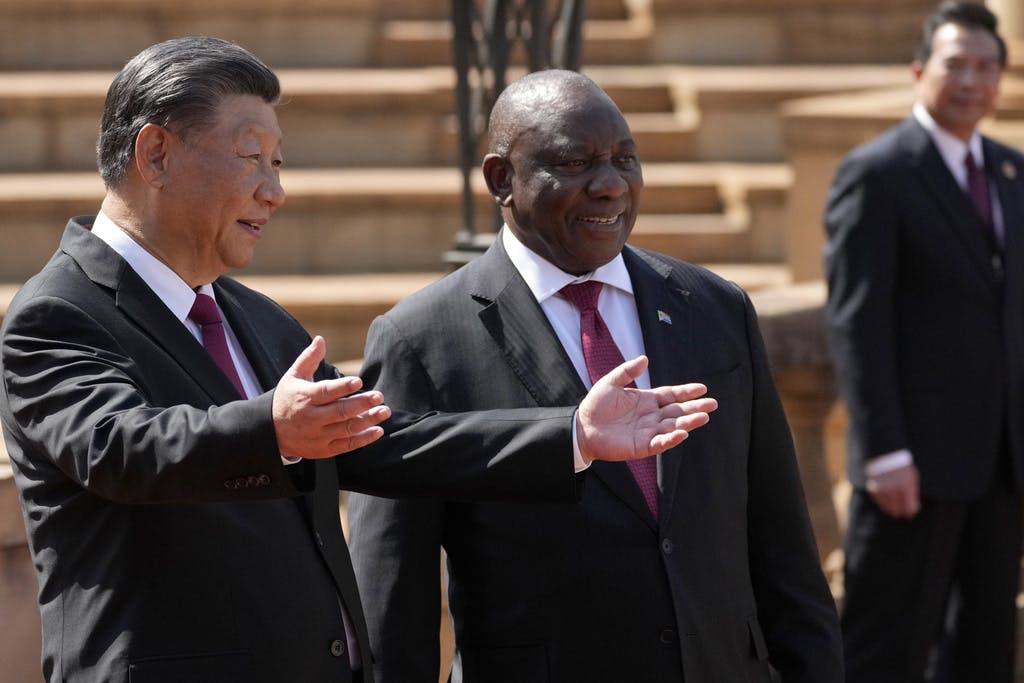Moscow, Beijing Will Push Anti-Western Agendas at Brics Summit in South Africa
Saudi Arabia is one of more than 20 countries to have formally applied to join Brics in another possible expansion of the bloc.

Russia and Communist China will look to gain more political and economic ground in the developing world at a summit in South Africa this week, when an expected joint dose of anti-West grumbling from them may take on a sharper edge with a formal move to bring Saudi Arabia closer.
The main summit on Wednesday — and sideline meetings Tuesday and Thursday — are expected to produce general calls for more cooperation among countries in the Global South amid their rising discontent over perceived Western dominance of global institutions.
Leaders from the Brics economic bloc of Brazil, Russia, India, China, and South Africa will hold three days of meetings at Johannesburg’s financial district of Sandton, with the Chinese president’s attendance underscoring the diplomatic capital his country has invested in the bloc over the last decade as an avenue for its ambitions.
President Putin will appear on a video link after his travel to South Africa was complicated by an International Criminal Court arrest warrant against him over the war in Ukraine. Russia’s foreign minister, Sergey Lavrov, will represent Mr. Putin in person. The Brazilian president, Luiz Inácio Lula da Silva, Prime Minister Modi, and South Africa’s president, Cyril Ramaphosa, will also be at the summit alongside President Xi.
At least one specific policy point that will be discussed and possibly decided on is the proposed expansion of the Brics bloc, which was formed in 2009 by the emerging market countries of Brazil, Russia, India, and China. South Africa was added the following year. Now, Saudi Arabia is one of more than 20 countries to have formally applied to join BRICS in another possible expansion.
Any move toward the inclusion of the world’s second-biggest oil producer in an economic bloc with Russia and China would clearly draw attention from Washington and its allies in an extra-frosty geopolitical climate, and amid a recent move by Beijing to exert some influence in the Persian Gulf.
“If Saudi Arabia were to enter Brics, it will bring extraordinary importance to this grouping,” India’s former ambassador to Saudi Arabia, Talmiz Ahmad, said.
Even an agreement on the principle of expanding Brics, which already consists of a large chunk of the developing world’s biggest economies, is a moral victory for the Russian and Chinese vision for the bloc as a counterbalance to the G-7, analysts say.
Both favor adding more countries to bolster a kind of coalition — even if it’s only symbolic — amid China’s economic friction with America and Russia’s Cold War-like standoff with the West because of the war in Ukraine.
Nations ranging from Argentina to Algeria, Egypt, Iran, Indonesia, and United Arab Emirates have all formally applied to join alongside the Saudis, and are also possible new members.
If a number of them are brought in, “then you end up with a bigger economic bloc, and from that a sense of power,” Alexis Habiyaremye of the College of Business and Economics at the University of Johannesburg said.
While Brazil, India, and South Africa are less keen on expansion and seeing their influence diluted in what’s currently an exclusive developing world club, there is momentum for it. Nothing has been decided, though, and the five countries must first agree on the criteria new members need to meet. That is on the agenda in Johannesburg amid Beijing’s push.
“Brics expansion has become the top trending issue at the moment,” Beijing’s ambassador to South Africa, Chen Xiaodong, said. “Expansion is key to enhancing [the] Brics mechanism’s vitality. I believe that this year’s summit will witness a new and solid step on this front.”
America has stressed its bilateral ties with South Africa, Brazil, and India in an attempt to offset any outsized Russian and Chinese influence emanating from Brics. In the buildup to the summit, the Department of State said that tWashington was “deeply engaged with many of the leading members of the Brics association.”
The EU also will closely follow happenings at Johannesburg, but with almost sole focus on the war in Ukraine and the bloc’s continued effort to draw united condemnation for Russia’s invasion from the developing world, which has largely failed so far.
If a Brics foreign ministers meeting at Cape Town in June, the precursor to the main summit, is anything to go by, there will be no public criticism of Russia or President Putin over the war.
If anything, Russia might see the summit as an opportunity to leverage some favor. Having halted a deal allowing the passage of grain out of Ukraine last month, Mr. Putin could use the Brics gathering to announce more free Russian grain shipments to developing countries, as he has already done for several African nations.
The Kremlin spokesman, Dmitry Peskov, said Mr. Putin would have “full fledged participation” in the summit despite appearing on a video link and would make a speech.
Also likely to be aired regularly over the three days at Johannesburg is the developing world’s gripes over current global financial systems. That has streamlined in the months and weeks leading up to the summit into a critique of the dominance of the dollar as the world’s currency for international trade.
